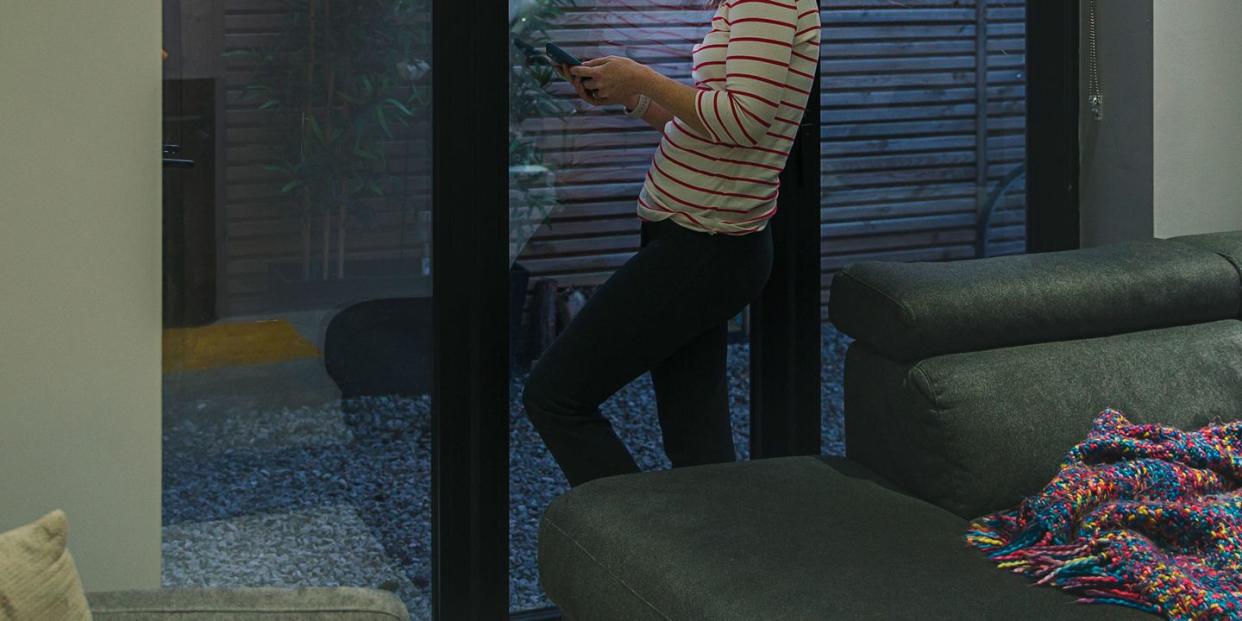How to help a friend in an abusive relationship during lockdown

Lockdown measures implemented to slow the spread of coronavirus have affected a lot of people in a lot of ways. And while, generally, social isolation has been enforced to provide extra safety to the British public, it comes with heightened risks for some. For those who live with abusive partners, lockdown can be dangerous.
Domestic abuse charity Refuge says calls to its helpline have risen by 25% since lockdown measures began. "Isolation is a tool used by perpetrators to control and abuse women, and its potential impact has been exacerbated by the current 'lockdown'," warned Sandra Horley, CBE, Refuge' Chief Executive.
If you know someone who you believe to be living in an abusive domestic situation, it's likely that you are eager to help in some way. And messages being shared on social media suggest different means of doing this, for example, by using code words.
But campaigners and domestic abuse charities such as Women's Aid are warning people not to follow these viral exercises. Why? "However well-intentioned, the advice is wrong. It could endanger survivors," Women's Aid tells Cosmopolitan UK. "In an emergency or at risk from harm, survivors should call 999. Making up your own code words can work well with trusted colleagues or family. But, the whole point of having your own code word is to keep it secret from the abuser. A code word on social media is public and means an abuser could see it."
A post shared by Women's Aid (@womens_aid) on Apr 9, 2020 at 7:21am PDT
So how can you help someone - a friend, family member or perhaps someone who lives close by - who you fear may be at risk of abuse?
If you live nearby, monitor the situation
"Neighbours are the people who are most likely to have regular contact with survivors of domestic abuse right now," says Refuge's Sandra Horley. "We urge everyone who is concerned that someone they know is experiencing domestic abuse to read our safety guide and resources and be on the lookout for any warning signs."
What are some of the warning signs you should be looking for? "The survivor is being deprived of basic needs such as food or medication, she is not allowed out to go out - not even once a day to the shops - or to call any support services including medical services. The abuser controls what she wears, where or how she sleeps, and how many times she washes her hands," explains Lisa Johnson, Manager of Direct Services for Women's Aid.
If you're near to the scene and something happens, DON'T intervene
"It is really important not to intervene in an altercation, as this could increase the risk of harm, both to [you] and to the woman concerned," warns Horley. "Instead, [you] must be ready to call the police and report an emergency."
Stay in touch if you can
"Where possible, keeping in touch with someone you are concerned about is an enormous factor in reminding them that they can contact you when they need support," advises Refuge's Chief Executive.
"Look for changes in their behaviour, as this may be a sign that something is going on at home. It is important to remember that leaving an abuser is a process, and on average it takes a survivor seven attempts before she is successful. With this in mind, try to be non-judgemental in your support, and remind them they are never alone and that the abuse is not their fault. It is important also to remind them that violence is a choice and abusers are responsible for making this choice - domestic abuse is against the law, and whatever goes wrong in a relationship, abusing women and children is unacceptable."

If a friend reaches out...
"Give her time to talk or write, but don’t push her to go into too much detail if she doesn’t want to," advises Women's Aid's Lisa Johnson. You should also encourage your friend/neighbour to try and keep a mobile phone with her at all times if possible. "The police are a key service when in immediate danger. Tell her not to be afraid to call 999 in an emergency," Johnson adds.
If a survivor tells you they are considering leaving home, they need to be given expert advice. "If you want to help, please share information about specialised domestic abuse services so survivors can get the help they urgently need here," says Women's Aid.
"Let her know our usual support services are open and our member services are working to deliver their life-saving work. Survivors often find accessing online help is safer than making a phone call where they could be overheard." The support services you can point someone in the direction of are listed in the next point below.
Make use of resources and support services
The most important thing you can do is to be aware of the resources available regarding domestic abuse. Women’s Aid hosts a Live Chat service on its website, which is open from Monday to Friday between 10am and 12pm. Seek out professional advice here if you're concerned about someone you know, and they will be able to instruct you on how to proceed based on the specifics of the situation.
Similarly, if you are concerned about someone you know you can call the Freephone 24h National Domestic Abuse Helpline, run by Refuge, on 0808 2000 247. Or you can visit this website to use a contact form for a call back from one of the charity's Helpline staff. They can offer you confidential support on how best to help the person you are worried about.
Donate to support charities' important, life-saving work
If you don't know someone personally who is experiencing domestic abuse at this time, but are keen to help, you can donate to Refuge, Women's Aid, or any other charity working to protect survivors of domestic abuse.
"It is critical that our Helpline and refuges continue to provide urgent support and safety for women and children trapped with their abusers, and we rely on public donations to do this," says Horley. "Donations can provide essential items for families arriving in our refuges, as well as equipment for our staff to work remotely during this challenging period."
A post shared by Refuge (@refugecharity) on Mar 19, 2020 at 1:45am PDT
How to seek help if you're living with domestic abuse during lockdown
If you are living with an abusive partner, Women's Aid's advice is to "try to keep a mobile phone on you at all times if possible and do not be afraid to call 999 in an emergency."
If you can’t speak after calling 999, there is a system called Silent Solution that you can make use of. Here's how it works:
If you are calling from a mobile phone, press 55 and the operator will transfer the call to the relevant police force as an emergency. The police call handler will then ask you a series of simple yes/no questions. If you’re still not able to speak, listen to the instructions you are given so the handler can assess your call and send help. However, calling from a mobile does not allow the police to track your location.
If you are calling from a landline, pressing ‘55’ will not work. If you can’t speak you should stay on the line and the operator will connect you to a police call handler. If you need to put the phone down, the line will stay open for 45 seconds. If you pick it up again during this time and the operator is concerned for your safety, they will put you through to a police call handler. Calling 999 from a landline means the police may be able to retrieve information on your location to send help.

Women's Aid's Lisa Johnson shares a few more pointers that could be useful to consider if you're in an abusive relationship during lockdown:
If you have children, teach them to call 999 in an emergency, and what they would need to say (for example, their full name, address and telephone number).
Are there neighbours you could trust to ask them to call the police if they hear sounds of a violent attack?
Always keep your phone nearby. In addition, keep with you any important and emergency telephone numbers, for example, the police, your GP, your social worker and solicitor if you have one.
Pack an emergency bag for yourself and your children and hide it somewhere safe, for example in the garden or a friend’s garage.
Keep your car parked so it can be moved accessibly (for instance pointing out of the drive and unobstructed) and make sure there’s always some petrol in it.
Establish a routine that enables you to leave the home such as putting the bins out so this could be an escape route of needed.
If you suspect that your partner is about to attack you, try to go to a lower risk area of the house, for example, where there is a way out and access to a telephone.
Avoid the kitchen and garage, where there are likely to be knives or other weapons. Avoid rooms where you might become trapped, such as the bathroom, or where you might be shut into a cupboard or other small space.
Beyond this, the Freephone 24h National Domestic Abuse Helpline and Women's Aid's Live Chat are available for advice, as well as both charities' other online resources.
"COVID-19 will not cause domestic homicides – only abusers are responsible for their actions," says Nicki Norman, Women's Aid Acting CEO. "The pandemic does, however, threaten to escalate abuse and close down routes to safety for women to escape. Support services are working around the clock to adapt to these unprecedented times. Survivors, we are here for you."
"Rest assured that you are not alone," echoes Refuge.
You can contact the Freephone 24h National Domestic Abuse Helpline, run by Refuge, on 0800 2000 247. Alternatively, you can visit Women's Aid's website for more information and resources. Live Fear Free provides support for women in Wales (0808 8010 800). Scotland’s Domestic Abuse & Forced Marriage Helpline is available 24/7, on 0800 027 1234. For anyone in Northern Ireland, call Women's Aid Federation Northern Ireland 24 hours a day on 0808 802 1414.
You Might Also Like

